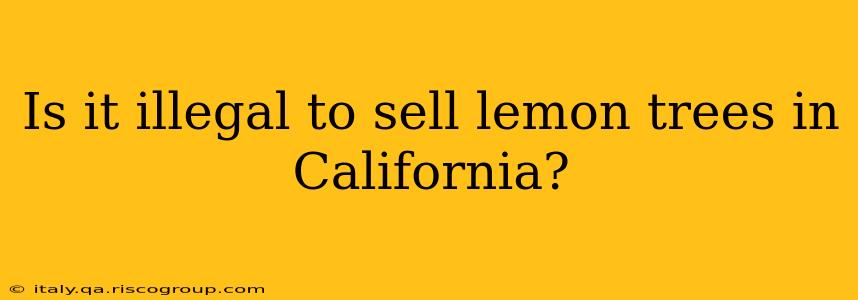Is it Illegal to Sell Lemon Trees in California? Navigating the Citrus World's Legal Landscape
The question of whether selling lemon trees is illegal in California is a bit more nuanced than a simple yes or no. While it's not outright illegal to sell lemon trees in the state, several regulations and considerations impact the legality and practicality of such sales. Understanding these factors is crucial for both sellers and buyers.
California's Citrus Industry and Regulatory Framework
California boasts a significant citrus industry, contributing substantially to the state's economy. This industry is carefully regulated to protect its health and productivity from various threats, including pests and diseases. These regulations are designed to prevent the spread of harmful organisms that could decimate crops. Therefore, the legality of selling lemon trees often hinges on compliance with these regulations.
Key Factors Affecting the Legality of Selling Lemon Trees
-
Quarantine Regulations: The California Department of Food and Agriculture (CDFA) plays a vital role in enforcing quarantine regulations. These regulations may restrict the movement of citrus plants, including lemon trees, particularly if they originate from areas known to harbor pests or diseases like Huanglongbing (HLB), also known as citrus greening disease. Selling trees from quarantined areas or without proper certification could be illegal.
-
Nursery Certification: Reputable nurseries selling lemon trees within California usually hold the necessary certifications and permits to ensure they're compliant with state regulations. These certifications demonstrate that the trees have been inspected and are free from known pests and diseases. Buying from uncertified sellers carries a greater risk of unknowingly spreading harmful organisms.
-
Plant Health: The overall health of the lemon tree being sold is crucial. Selling visibly diseased or infested trees is not only unethical but may also be illegal depending on the severity of the infestation and applicable regulations.
-
Proper Labeling and Documentation: Accurate labeling and documentation are essential aspects of legal compliance. This includes providing clear information about the plant's origin, variety, and any necessary treatments or certifications.
Legal Implications for Sellers
Failing to comply with California's citrus regulations can result in significant penalties, including fines and the potential seizure of the affected plants. These penalties are designed to protect the state's valuable citrus industry and prevent the spread of potentially devastating diseases.
Best Practices for Legal Lemon Tree Sales in California
- Source Trees from Certified Nurseries: This is the most reliable way to ensure compliance with regulations.
- Understand Quarantine Regulations: Stay updated on any quarantines or restrictions imposed by the CDFA.
- Inspect Trees Thoroughly: Before selling, meticulously examine trees for any signs of disease or infestation.
- Maintain Proper Documentation: Keep records of the tree's origin, treatments, and any certifications.
- Comply with Labeling Requirements: Ensure all labels accurately reflect the tree's information.
Conclusion: Proceed with Caution and Compliance
While selling lemon trees isn't inherently illegal in California, navigating the regulatory landscape is crucial for avoiding legal pitfalls. Prioritizing compliance with CDFA regulations, sourcing trees from certified nurseries, and maintaining proper documentation are essential steps for both sellers and buyers to ensure safe and legal transactions within California's vibrant citrus industry. If you have doubts, contact your local agricultural extension office or the CDFA directly for guidance.

